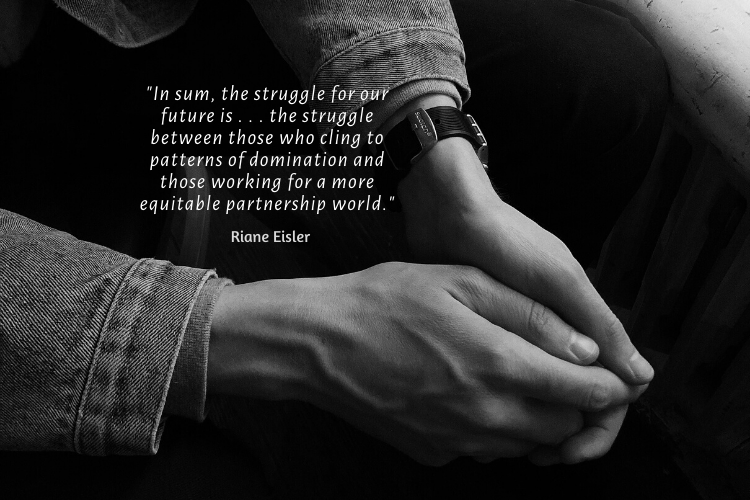Riane Eisler: Nurturing our Humanity

Dr. Riane Eisler is a social systems scientist, cultural historian, and attorney whose research, writing, and speaking has transformed the lives of people worldwide. Riane Eisler pioneered the expansion of human rights theory and action to include the majority of humanity: women and children. She is internationally known for her bestseller The Chalice and The Blade: Our History, Our Future. Her latest book is Nurturing Our Humanity: How Domination and Partnership Shape Our Brains, Lives, and Future.
An Interview with Riane Eisler – Nurturing our Humanity
Interview By Sandie Sedgbeer
To listen to the full interview of Riane Eisler by Sandie Sedgbeer on the radio show, What Is Going OM on OMTimes Radio, click the player below.
Everywhere we turn from news to books and movies; we are bombarded with the same hackneyed message: human nature is inherently bad. Looking at the senseless violence, the greed, murder, rape, and war around us, we humans, it seems, are genetically wired for selfish, cruel behavior.
Or are we? Are violence, greed, domination, and control a fundamental and ineradicable part of human nature? Absolutely not, says cultural historian, social systems scientist, and author, Riane Eisler, whose international bestseller, The Chalice, and the Blade has been hailed as the most important book since Darwin’s Origin of Species.
In this interview with Sandie Sedgbeer, Riane Eisler discusses her latest book, Nurturing Our Humanity: How Domination and Partnership Shape our Brains, Lives, and Future, co-authored with anthropologist Douglas P. Fry, in which they both upend age-old assumptions about human nature and provide irrefutable evidence that not only is caring behavior humanity’s default tendency but also that we can build more humane and sustainable societies.
Sandie Sedgbeer: Your book, Nurturing Our Humanity: How Domination and Partnership Shape our Brains, Lives, and Future does a sobering reading.
The statistics are pretty darn, horrifying. I didn’t know whether to be elated or depressed.
And yet, you also paint a picture of how we can be, and about what sort of society we can create if we pay attention to what is needed.
Your book, The Chalice and the Blade sold more than half a million copies worldwide, and LA weekly said that it may be the most significant work published in all our lifetimes. The well-known Chilean author, Isabel Allende, said that it’s one of those magnificent key books that can transform us and initiate fundamental changes in the world. That was published in 1988. What inspired you to write this new book 31 years later? Is it because those fundamental changes are not being initiated?
Riane Eisler: Well, that is certainly part of it. Another part of it is simply that as the years have gone by, my research has deepened and broadened. And so, in Nurturing our Humanity, I combined my research and my new approach to understanding human societies with two new, very important areas. One is neuroscience because what we’re learning in terms of the conceptual framework introduced in my work is what the subtitle says – that our brains develop differently, in the coaches that orient more to the partnership or the domination side of the social continuum. The second area, I’ve been working on this book for 10 years, and three years ago, I invited Doug Fry to be my co-author because he is one of the world’s authorities on foraging societies. And we’re all familiar with that old story, aren’t we? About “the selfish genes, evolutionary imperatives, too bad, you know, that’s just how we developed? So, rape and killing and injustice, they’re just human nature.” And what he calls ‘foraging societies,’ show how humans lived for millennia, the original partnership societies. So, this book ends with some very practical and very important cornerstones that my research shows are essential if we’re to move to a more equitable and sustainable future.
Sandie Sedgbeer: It seems that over the past few decades, we are devolving rather than evolving. We’re seeing a move away from globalism to tribalism, a resurgence in fundamentalism, displacement of people, and abuse of humans by other humans. Are we hearing about it more? Has it always been like this in our recent history? Or is something happening to create this division?
Riane Eisler: It’s a combination. Certainly, we’re hearing about it more. I mean, it used to be that violence against women and children was ignored frankly, even here in the United States. If there was what they like to call domestic violence – I call it intimate violence – all the police did, if they were called, was just walk the guy around the block so he could go back home and do it again. Right. So that is part of the forward movement. We are also in the midst of what I call a massive regression to the domination side of the partnership domination social scale. And all of the things that you mentioned are part of that regression. They’re not isolated. They’re not random. They are part of a pattern. Real history is not linear.
You know, this whole notion of the linear movement from quote “barbarism” to quote “civilization,” is nonsense. Yes; if you look at the European Middle Ages and you look at today, there’s been tremendous forward movement. Sometimes I say it as a joke, that when I get depressed about what’s happening, I think of the European Middle Ages. They looked a lot like the Taliban, the Inquisition, the Crusades, the witch burnings. Women had no rights. Children have no rights. But we’ve had one progression after another. I was born into one, the rise of Hitler, in Europe, first in Germany, and then my native Austria. So, this new book addresses this, very front of the end, and the four cornerstones that it ends with are essential if we are to have the foundations that will avoid these regressions.
Sandie Sedgbeer: When I finished reading your book, I went to Wikipedia and started looking at the statistics for school shootings. I was shocked to see that records existed back to 1840, and I counted all of the school shootings in this century, the 21st century. Your research demonstrates that the tragic shootings of the past several years may very well stem from the impact of growing up in a dominate domination culture or family that supports these rigid top-down rankings and is held together by fear and force. Would you tell us a little bit about the differences between the domination culture and a partnership culture?
Riane Eisler: When I embarked on my research, which was really to understand why there is so much violence and so much injustice, it became very clear that using the conventional social categories, like right versus left, religious versus secular, eastern versus western, northern versus southern, and so on, are useless in terms of answering that question. If you think about it, there have been violent, repressive regimes in all these categories. But one thing that’s very different about the new categories between the partnership and domination systems and these old categories is that the old categories either ignore or marginalize the status of the majority of humanity, women, and children. And they focus primarily on what I call the top of the domination, pyramid politics, and economics as conventionally defined.
But it’s in families, as you said, Sandie, that children first learn what is normal or abnormal, possible or impossible, a moral, they’re taught, right? And in domination families, children are taught that using violence, physical discipline against children is all right. Or they observe violence against their mothers and think that’s okay, that’s moral. So, what do they learn? That it’s okay to use violence to impose your will. And this is a basic list for maintaining domination systems and it’s also a basic lesson for what it means to be a man. I mean, notice that these shootings are almost exclusively men and young men, and they have been socialized to not be like a woman, right? Which means soft, caring, nonviolence care, and caregiving. They’re not supposed to be that way. And the gun in the United States, of course, is a symbol of manhood, isn’t it?
Continue to Page 2 of the Interview with Riane Eisler
A veteran broadcaster, author, and media consultant, Sandie Sedgbeer brings her incisive interviewing style to a brand new series of radio programs, What Is Going OM on OMTimes Radio, showcasing the world’s leading thinkers, scientists, authors, educators and parenting experts whose ideas are at the cutting edge. A professional journalist who cut her teeth in the ultra-competitive world of British newspapers and magazines, Sandie has interviewed a wide range of personalities from authors, scientists, celebrities, spiritual teachers, and politicians.






